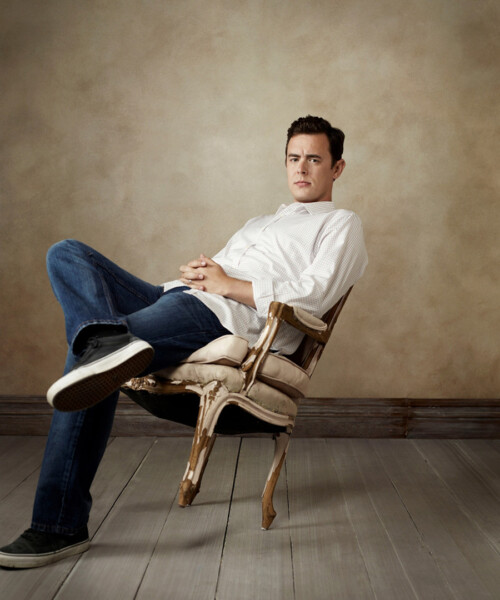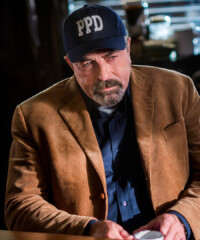Before music was available at the swipe of a screen, you’d have to look for the big yellow-and-red sign. Whether you were in Los Angeles, New York or several dozen cities across Japan, Tower Records was an internationally recognized destination for the world’s latest and greatest albums—that is until it declared bankruptcy. In his new documentary All Things Must Pass: The Rise and Fall of Tower Records, Colin Hanks (who also stars in the CBS series Life in Pieces) charts the dizzying heights of success that the family-run business reached, and deftly maps the decline that mirrored a seismic change in the way the world consumes its entertainment.
Here, Hanks shares the story of his inspiration, his seven years of research and his own record-shopping habits.
The life and times of Tower Records makes for a compelling story, but how did you decide this was something you wanted to investigate?
I’ve always been a passionate music fan, and from a young age I had a very rudimentary understanding of Tower. I knew it was from my hometown of Sacramento, and I had a godmother who had worked at Tower along with some other family friends at various points during their younger days in the Bay Area. That was it. I didn’t know anything about the history of the company or anything like that. But when the stores were closing, I was having a conversation with someone from Sacramento, a friend’s mother, about what a bummer it was and she said, “Oh gosh. I can’t believe that all started in that little drugstore.” And I had no idea what she was talking about. And I said, “Excuse me what drugstore? What are you talking about?”
What was the story she told you?
She proceeded to tell me about the history of Russ Solomon’s father’s drugstore. It started in the late 1930s or early 1940s in this classic American drugstore, with the soda fountain and the whole nine yards, and it ends with Russ closing almost 200 stores around the world. And I thought there had to be some sort of documentary in there. So, I ended up spending the next few months doing a bunch of research, and the more I discovered the more I was sort of fascinated by the trajectory of the company being. Once it came together, I made our pitch to Russ.
Was he at all reluctant to talk?
No, he was game from the get-go. He’s pretty much up for anything. He heard we wanted to make a documentary about him, and he thought we were OK guys and he said, “Well, I don’t know anyone who is going to be really interested in that, but if you guys want to do it alright! Let’s go.”
The movie isn’t just Russ, you talked to all kinds of employees and members of the Tower inner circle. What did you learn along the way?
I was really surprised by just the personal story this was. My initial interest was really from the historical perspective—here’s a company that started this way and this is how they expanded and these are the factors that led to its success—but as we got to know these people who are characters in the film, I gained a much larger respect for how Russ operated.
How was his operation different from any other?
By the early 1990s, Tower was already a huge success. But thanks to the way that it all started and the amount of control that Russ gave people—the fact that people had started out as clerks and worked their way up in the company and stayed there for 30-plus years—that was incredibly special. When we started making the documentary, the economy had just taken a gigantic nosedive and a lot of people were losing their jobs. A lot of people were losing their savings. I became very aware of the fact that not a lot of people had jobs security. So, there ended up being this connection here with Tower where these people were able to give a huge chunk of their lives to this company and then they had to fire each other. There’s a lot of different stuff you learn over the course of seven years, not only about making documentaries, but also the story that you are telling. And there’s a constant state of discovery.
We’re living in an age where record stores, to the extent that they still exist, are really specialty shops. People buy music from their phones. What makes now the time for a movie about Tower Records?
For the people who do know Tower, I think it’s far enough into the rear view that they can now realize what was special and what was unique about Tower and celebrate it. When we started, pretty much everyone was like who’s going to car, but we knew that there were a large number of people who worked at Tower and shopped at Tower and knew how special it was. For the people who don’t know, or who barely remember Tower, I hope there is a personal connection. Hopefully, people can watch the film and realize they have their own personal connection to the characters. They can appreciate the journey that Russ goes on. They can appreciate the journey that his family went on together and all the things they were able to accomplish. How incredibly unique it is to have a job that you love.
Do you still go record shopping?
Oh, absolutely. I have taken an obsession. I travel with a little portable turntable when I go on vacation, and I don’t bring any records with me so it forces me to go out to the shops and find out what’s going on in that city. There’s a whole ritual to it.







































